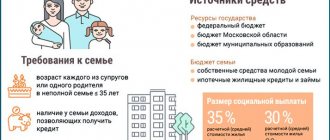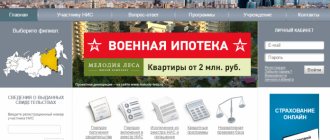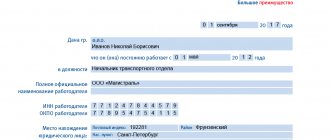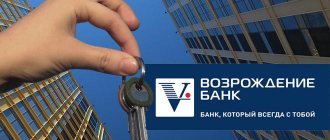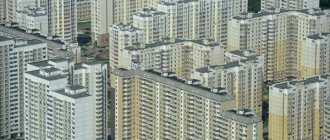Program description
A federal-level social project aimed at providing working youth in rural areas with their own houses and apartments is a way to attract university graduates to remote settlements. State support consists of providing housing for young professionals, namely by providing them with subsidies on the following conditions:
- preferential lending with a rate of 5% per annum for 10 years;
- the payment amount can be up to 70% of the price of a house or apartment in the corresponding locality;
- Debt repayment is carried out in small equal parts - from each specialist’s salary.
A young education or healthcare employee must live in the village on a permanent basis. Moreover, he is required to work in rural areas for at least five years from the date of receipt of the subsidy.
Providing funds not in the form of irrevocable assistance, but in the form of a loan encourages young people to take action and eliminates the mood of dependency.
Personnel who come to work in the village as part of the “Housing for Young Professionals” program can buy real estate on the primary or secondary market, as well as build a house.
Conditions for participation in the program
Many graduates of Russian universities do not strive to move to rural areas because they believe that it is quite difficult to fulfill the conditions of government programs for young specialists.
In fact, anyone can get on the waiting list to receive a subsidy. You should start moving towards your goal by preparing a package of documents, which includes:
- an application, the form of which can be requested from the municipal housing department;
- copy of passport (with mandatory notarization);
- certificate from the place of employment (budgetary institution in the relevant locality);
- certificates from the municipality in form 7 and 9.
It is worth paying attention to the fact that the state program “Housing for Young Professionals” is designed for citizens who meet the following criteria:
- Age: no older than 35 years.
- Availability of professional education appropriate to the place of work.
- Work in your specialty for three or more years.
A program participant can count on subsidies from the state only if he started working in his specialty within three months from receiving his diploma or is still in his final year of study.
The status of a young worker is maintained for three years from the date of commencement of work.
Features of the program
Subsidizing young professionals who decide to realize their professional potential in rural areas has a number of features.
Preferential lending
Funds for the purchase of housing are by no means allocated free of charge. State support takes the form of a preferential loan for a period of 10 years at a rate of 5%.
Availability of own capital
As with mortgage lending, the employee will be required to provide a down payment of at least 30% of the price of a house or apartment in the relevant locality. The state is ready to provide the remaining 70% of the amount.
Important point: Each region sets a limit on the maximum cost of housing, taking into account which the amount of the subsidy and the down payment is calculated.
Cumulative nature
If a worker comes to a rural area without savings, this does not mean that he has no chance of receiving a subsidy. If he submits an application for participation in the program and it is approved, he will be given 18 months to save a third of the cost of housing.
Repayment in equal installments
Covering the debt is distributed over the entire period of ownership of the funds, and therefore comes down to small monthly deductions from the young specialist’s salary.
A young employee can repay a soft loan at any time without penalties or commissions.
Additional benefits of the program
In order to attract graduates of higher and secondary specialized educational institutions to rural schools, they are also provided with:
- Preferential terms for renting housing in state-owned properties (during the waiting period).
- The opportunity to purchase comfortable and modern housing through the construction of new housing complexes in partnership with construction companies.
A young teacher can build himself a house in the village from scratch, rather than buying it ready-made. In this case, the subsidy covers 50-70% of the costs of constructing the facility.
As for doctors, the “Zemsky Doctor” subprogram was launched especially for them, which provides for:
- provision of a “lifting” allowance in the amount of about 1 million rubles;
- conditions for temporary residence.
The allocated amount must also be used to purchase a house, apartment or build a residential property.
What payments are due to young professionals?
In the public sector there is a significant need for new personnel, so special measures are taken to attract them. These include payments intended for young professionals. This material examines who is usually classified in this category, what types of support are usually provided to them and in what amount, what is the procedure for registration and receipt.
Who is classified as young Russian specialists?
Enrollment in this category of beneficiaries occurs if a number of mandatory conditions are met:
- be under the age of 30-35 years;
- receive higher or secondary specialized education in a Russian educational institution with state accreditation as a full-time student;
- study on a budget;
- get a diploma;
- get a first job in a specialty in distribution (in a direction) in a public sector organization;
- No more than a year should pass between passing the final certification and employment.

The status of a young specialist is maintained for three years. This period may be doubled if the employee:
- called up for military service;
- went on leave for employment and childcare until he turns three years old;
- undergoes postgraduate studies full-time.
What should be paid to those who arrived to work in the direction of graduates?
Art. 70 of the Labor Code gives young specialists the right to get a job without a probationary period. In addition to guaranteeing employment, the state reinforces the position of graduates who come to work as assigned with various regional benefits and benefits:
- one-time, monthly and incentive payments;
- salary bonuses;
- compensation for moving expenses and maintaining children in preschool institutions;
- special conditions for purchasing housing and paying for housing and communal services;
- additional leave.

In what order are lifting permits issued for a young specialist?
The most attractive among the measures by which the state stimulates young graduates are tax-free payments that can be provided for employment in the public sector in the following areas:
- at one time;
- for the entire three-year period - annually.

For the most part, the provision of such support is associated with a commitment to work for three to five years. So-called lifting payments are provided to young specialists, as usual, within the first month after starting work. An employee who is employed by referral submits to the manager an application with a request to pay allowances, written in any form. Apply to it:
- original and copy of diploma;
- copy of the work document;
- employment contract.
Depending on the departmental affiliation of the organization, specialty and regional design features, the list may be supplemented. Upon review by the manager of the application for the appointment of lifts, a corresponding order is written and presented to the applicant for signature. The money will be transferred in the manner accepted in this organization:
- to a bank card;
- in cash - through the institution's cash desk.
In what size will a novice specialist be provided with lifts?
The one-time payment established for young specialists, as a rule, is equal in value to one or several official salaries. Regional differences are significant. The greatest interest in combination with opportunities to attract young personnel is shown by Moscow and St. Petersburg, as well as Irkutsk.
In small cities, it is customary to limit yourself to 10-20 thousand rubles. Moscow schools attract aspiring teachers by offering 100,000 allowances and a monthly bonus. St. Petersburg gives young teachers 50,000, increasing this amount to more than 67 thousand if the young teacher graduates from a university with honors. These measures are complemented by a 40% salary bonus for higher education. Irkutsk young teachers' allowances of 50,000 rubles were supplemented with significant bonuses to the official salary, which are given over three years, gradually reducing their size.

The most significant are the lifts provided for by the “Zemsky Doctor” program, designed to attract young doctors to the countryside.
What kind of support does the state provide to specialists who come to work in rural areas?
In order for young people to come to work in villages, they need to be offered something very significant, like providing housing. The “Young Specialist in Rural” program provides for the simultaneous achievement of two goals:
- Provide small settlements with medical and teaching staff of appropriate qualifications.
- Solve the housing problem that is acutely facing young people who have graduated from universities.

Persons who agree to take part in the program are offered to enter into a contract for a five-year period. Promising to work in his specialty during this period at the proposed place, a university graduate participating in the program will receive an amount sufficient to:
- buy residential premises under construction;
- purchase housing in the secondary market;
- carry out major repairs to an existing home.
The program participant must meet the following requirements:
- be no older than 35 years old;
- get a higher education (or soon complete your studies at a university);
- do not own residential real estate or live in conditions that do not meet the requirements of social norms;
- live in a rural area or express readiness to move.
To document participation in the program, an application must be submitted, supported by a package of documents, which must include:
- passports;
- diploma of higher or secondary specialized education;
- children's birth certificates;
- a certificate issued by a special commission that examined the housing, confirming that the applicant really needs to improve living conditions;
- a certificate provided by the bank confirming the availability of a sufficient amount of money to make a down payment for the purchase/major repair of housing.
Having not fully completed the period stipulated by the agreement, you will need to return part of the amount proportional to the remaining period.
Among other benefits provided to young professionals to interest them in the offer to work in rural areas:
- partial compensation for housing and/or housing and communal services (solid fuel);
- supplements to official salary.
How payments are provided and taxation is carried out
By promising significant benefits to young professionals, the state significantly increases their size, removing them from taxation. Thus, one exemption from personal income tax on issued lifting allowances has a noticeable impact on their value.

In order to more firmly tie a recent graduate to his place of work, in many regions they provide him not only with a one-time payment, the so-called allowance, but also with a decent monthly additional payment for the entire three-year period. In Moscow, teaching bonuses for young specialists reach 40%, and if they have a diploma with honors - 50%. In the Irkutsk region, an original solution was found to the problem of how to interest recent university graduates to work in schools:
- in the first year of work, a young specialist is paid an additional 60% of his salary;
- in the second year – 36%;
- on the third – 24%.
Practice shows that already in the first year of work it becomes clear whether a recent graduate will work at a school or will look for another occupation.
Documents for registration of benefits provided to young professionals
In order to receive certain payments, compensations or benefits, employees who are just starting to work in their specialty will need to write a corresponding application, indicating in it what additional documents are attached as confirmation. The list is usually small; there should be room for copies:
- passports;
- diploma;
- work book;
- INN/SNILS

What are they trying to compensate for teaching staff?
The introduction of bonuses does not limit incentives for attracting teachers (and educators) to work. The advantage of working in the field of education is the right to receive long paid annual leave (45 days), which is also provided during the most favorable summer months.
How housing is paid for and a mortgage is provided
In rural areas, payments due to young specialist teachers are supplemented by the opportunity to obtain a mortgage on preferential terms:
- with the lending rate reduced to 8.5%;
- an initial payment subject to compensation from the regional treasury;
- with an extended term of a loan for the purchase or major renovation of residential real estate.

How to solve the problem of relocation
For a young teacher who has been assigned to a locality remote from his place of permanent residence, the regional treasury reimburses expenses for moving to his place of work:
- at a distance of up to 150 km, moving with family;
- up to 500 km - alone.

In addition, he is provided with payments:
- on a business trip - daily allowance;
- in the form of retention of wages for a six-day period;
- as a salary increase for the first month of work.
What are young doctors and researchers compensated for?
For such specialists, assistance can be provided in the form of:
- one-time;
- monthly;
- incentive payments.

What is offered at a time in the regions
The largest payments are provided for by the Zemsky Doctor program, designed not only for recent graduates of medical institutes. Of the 1,000,000 rubles earmarked for solving the housing problem, 60% comes from the federal budget, 40% from the regional budget. To receive them after a 30-day period in a bank account, the physician will need to provide the regional MHIF with the application for concluding an agreement with the Ministry of Health originals and notarized copies:
- Russian passport;
- TIN;
- diploma;
- confirmation that the internship has been completed;
- confirmation that the specialist has been hired.
In order to more reliably retain a young doctor or scientist, regional authorities extend lump sum payments over the entire three-year period, as, for example, in the Penza region or Ulyanovsk region.
What is due monthly
A young specialist, a doctor or a scientist, is entitled to a bonus payment during the first year of work in distribution. Its value is set at the regional level, but should not fall below the official salary.

What is meant by stimulants?
An incentive for young doctors and scientists is quite significant funds, on average about a million rubles, which will be provided when sent to work in rural areas according to the order.
How it's done by Russian Railways
As an example of an integrated approach to solving the problem of young specialists, we can consider actions to support university graduates preparing personnel for Russian Railways. The assigned graduate will be given:
- one week of paid leave after moving to the place of employment;
- reimbursement of funds spent on relocation;
- daily allowance – as compensation for moving costs;
- reimbursement of expenses for renting residential premises;
- official salary

At the regional level, these measures can be supplemented. For example, in the Penza region, a young specialist who has worked for the first year will be given two official salaries.
Goals of creating the program
The reasons for the refusal of young people to look for employment in the village are quite obvious: low standard of living, low salaries, lack of comfortable housing.
In this regard, federal and regional programs are being launched in rural areas, consisting of paying subsidies to young personnel, providing them with decent housing, etc. One of the most popular programs at the federal level, which aims to return young people to the village, is the social project “Young Specialist in the Village”.
The program for rural specialists provides for two main areas of state support for qualified young workers:
- firstly, providing housing for young professionals in rural areas;
- secondly, providing them with a “lifting” subsidy to improve their living conditions.
The “Young Rural Specialist” program is designed for teachers, doctors, as well as other specialists, mainly in the social sector. In order to receive support from the state, a worker must move to a village, get a permanent job there and find a place to work.
In this case, three key criteria must be met:
- The employee must have a diploma in the relevant field or be a final year student (some university graduates are looking for a job already while writing their thesis for a detailed study of the practical part). No more than 3-5 years should pass from graduation, depending on the requirements of the regional program.
- The specialist must be no more than 35 years old (however, his specialized education may not be the first).
- The young employee must have a certificate of lack of own housing, which can be issued at the municipal administration,
- He must be registered as needing housing or be recognized as having no housing in a specific rural area.
Since 2020, the “Zemsky Doctor” program, designed for healthcare workers, has been implemented at the federal level in villages of the Russian Federation. The “Young Specialist in the Rural” project is often called a program for rural teachers.
Requirements for young professionals
Not all young professionals can count on receiving government support. Regulatory legal acts provide for certain criteria:
- The employee must have a diploma in the relevant qualifications; he may be a final year student - some graduates are looking for jobs at the stage of writing their thesis. No more than 3-5 years can pass from the moment of graduation. More specific times will be indicated in the regional program.
- The specialist's age should not be older than 35 years. And specialized education may not be the first.
- The young specialist must be registered as needing housing and not have housing in this rural area - this status must be confirmed by a certificate from the local municipality.
The legislative framework
Receipt of benefits and financial assistance for young personnel from the state is regulated at the legislative level by regulations of local importance. In each region they are individual.
The basis of all these acts is the federal program “Social Development of Rural Affairs”. It was approved by Government Decree No. 858 of December 3, 2002.
Initially, it was expected that the assistance program would operate until 2013 . But another legislative act in 2020 extended it until 2020. Providing young professionals with housing occurs within the framework of this particular program.
Since 2020, the federal program “Zemsky Doctor” has been implemented in Russian villages, adopted to support healthcare workers. And the “Young Specialist in the Rural” project is more aimed at teachers.
According to the order of the President of the Russian Federation on the implementation of the Address to the Federal Assembly dated February 20, 2019, the legal basis for the approval of the Zemstvo Doctor program was established. From 2020, payment of monetary compensation is provided.
You can read more about how to get a million rubles. To do this, a young doctor needs to come to work in a rural area or village with a population of up to 50 thousand people. The Russian Ministry of Education is still preparing a detailed plan for the implementation of this social project.
Registration procedure
To take part in the program, a specialist must contact the housing committee in his region. Before submitting documents to participate in the program “Providing housing for young professionals in rural areas”, you must be recognized as in need of improved housing conditions. After receiving the relevant document, you can apply for a subsidy.
To do this you must provide:
- Passports of all family members and birth certificates of children under 14 years of age;
- A diploma of completed secondary or higher education from an institution that has state accreditation;
- An employment contract and work record book, as confirmation of employment in a specialty in rural areas;
- Document confirming marital status: certificate of marriage or termination of marriage;
- Act of the housing commission on the condition of housing, which makes a conclusion whether or not a citizen needs to improve living conditions;
- A document from Rosreestr stating that there are no registered residential premises in the applicant’s name, if the specialist does not have his own housing;
- A bank statement indicating the availability of 30% of the amount of the cost of the apartment, to confirm the applicant’s solvency.
The list of documents may be increased by regional regulations.
USEFUL INFORMATION: Driving without a license after deprivation: punishment
Local authorities check the submitted documents and create a list of program participants. The application review period is 2 months. After the deadline, the applicant is sent an official response about the inclusion of a specialist in the queue to receive a subsidy.
The timing of receipt depends on the regions and the number of specialists applying for a subsidy.
Rural administrations send lists to executive authorities by September 1 before the coming year. Based on the number of applicants, the approximate size and number of subsidies are compiled. Executive authorities form lists of applicants and notify them.
The calculation of the number and amount of subsidies that will be sent from the federation to the constituent entities is made after the approval of the annual budget, after November 1.
The Ministry of Agriculture takes into account the following factors when distributing:
- The population of the village, its standard of living;
- How much emergency and dilapidated housing is there in this rural area;
- Labor shortage in this region;
- Average cost per square meter.
The subsidy is issued to young specialists for a period of no more than 10 years at 5% per annum. The payment amount is divided into equal parts.
The transfer of subsidy funds allocated by the state is made by the credit institution to the account:
- The seller, in case of purchasing an apartment under a sale and purchase agreement from a private person;
- To a contractor who is building a house for a young specialist;
- To the developer, if the apartment is purchased in a building under construction;
- To the seller of building materials under a sales contract, if a private residential building is being built on its own.
During the program, many regions received professional specialists in rural areas. The results of the program cannot go unnoticed. Graduates have an incentive to get not only well-paid jobs, but also to purchase housing on preferential terms.
About the implementation of this program in the Kuraginsky district, see the following video:
Young specialist program | About professions.ru
Today, an important problem in megacities is the difficulty of finding jobs for educated youth. Therefore, today one can observe how millions of young people live in poverty, do not have housing and find work that is indirectly not related to the education they actually have
What to do in such a complex and ambiguous situation? There is an emerging understanding that it makes sense to send specialists to those parts of the country where their services are needed. Therefore, the issue of housing is automatically connected to the issue of employment.
A stepping stone to overcoming the problem was the federal program for young specialists, which provides support for educated youth within the village.
The category of young specialists includes educated graduates who have achieved a specific specialty in government institutions
At the same time, it is important that the age of young people does not exceed 35 years of age
Also, a key condition for maintaining the status of a young specialist is compliance with the following condition: the break between graduation and the start of professional activity should not exceed 12 calendar months. The young specialist program is valid from the date of signing the work agreement.
Over a 3-year period, the young person will be recognized as a young specialist. Only in this way will he be able to receive the long-awaited benefits that the young rural specialist program mentioned above speaks about.
Young specialist program in rural areas 2020: social benefits and payments
Young people - graduates of educational institutions, sent to the village, receive a number of benefits and social payments. It is precisely such incentive measures that will be able to support their lives in the difficult conditions of modernity and the countryside.
The program to support young professionals who have settled in the village promises certain financial assistance in the form of:
- raising government funds;
- one-time charges.
For example, the program for young professional teachers and kindergarten teachers includes an addition to the monthly salary for three years. Such citizens are also entitled to a one-time government payment
But here it is important to remember that it is carried out only after the validity period of the employment agreement has come to an end.
Lifting (incentive) accruals are issued to a young employee in the first month after signing an employment agreement. Payment for lifting comes from the money available to the official employer.
In the event of a termination of the employment contract (an example would be a situation where a young specialist decided to leave the village sooner than after 5 years), the former participant in the state program described above will have to return the money.
It should be emphasized that young medical workers receive social payments according to such a growing state program as “Zemsky Doctor”.
The program to attract young specialists was introduced in 2002 in order to interest graduates in life in the village. Most recently, its effect was extended by representatives in power.
Therefore, an apartment under the young specialist village program implies the allocation of monetary assistance from the state budget so that the housing problem can be solved for citizens settling in the village. The subsidy is a preferential loan at 5% per annum.
In this case, the Young Professional Mortgage program considers repaying the money through monthly payments over a ten-year period.
The program for a family of young professionals has a significant advantage - it is a chance to obtain a government loan at 5% per annum for up to ten years. At the same time, housing programs for young professionals calculate the amount of the subsidy taking into account the price of specific square meters and living space standards per citizen. The specialist has every right to direct this payment to:
- acquisition of residential “squares” in the village;
- construction of a cottage in a rural region or at the end of its construction;
- acquisition of residential “squares” in a multi-storey building being built in a rural district.
Young specialist program 2020: who can participate in it?
The terms of the young specialist program allow the following circle of people to receive a subsidy:
- young workers who have not yet turned 35 years old;
- citizens permanently residing in the village;
- young workers experiencing housing problems;
- persons who own an amount of 30% of the price of the purchased housing;
- persons who received knowledge in one of the territorial government institutions;
- specialists who are assigned to work in a village and have entered into an official labor agreement in their specialty there;
- citizens who have worked in the village under an employment agreement for at least 3 years.
Participation in the program will give a young specialist a chance to take advantage of a subsidy from the state apparatus. At the same time, every young citizen will be required to work in the village in the social sphere or in the agro-industrial complex for at least 5 years.
You might be interested in:
What payments are due to young professionals?
In the public sector there is a significant need for new personnel, so special measures are taken to attract them. These include payments intended for young professionals. This material examines who is usually classified in this category, what types of support are usually provided to them and in what amount, what is the procedure for registration and receipt.
Who is classified as young Russian specialists?
Enrollment in this category of beneficiaries occurs if a number of mandatory conditions are met:
- be under the age of 30-35 years;
- receive higher or secondary specialized education in a Russian educational institution with state accreditation as a full-time student;
- study on a budget;
- get a diploma;
- get a first job in a specialty in distribution (in a direction) in a public sector organization;
- No more than a year should pass between passing the final certification and employment.
The status of a young specialist is maintained for three years. This period may be doubled if the employee:
- called up for military service;
- went on leave for employment and childcare until he turns three years old;
- undergoes postgraduate studies full-time.
What should be paid to those who arrived to work in the direction of graduates?
Art. 70 of the Labor Code gives young specialists the right to get a job without a probationary period. In addition to guaranteeing employment, the state reinforces the position of graduates who come to work as assigned with various regional benefits and benefits:
- one-time, monthly and incentive payments;
- salary bonuses;
- compensation for moving expenses and maintaining children in preschool institutions;
- special conditions for purchasing housing and paying for housing and communal services;
- additional leave.
In what order are lifting permits issued for a young specialist?
The most attractive among the measures by which the state stimulates young graduates are tax-free payments that can be provided for employment in the public sector in the following areas:
- at one time;
- for the entire three-year period - annually.
For the most part, the provision of such support is associated with a commitment to work for three to five years. So-called lifting payments are provided to young specialists, as usual, within the first month after starting work. An employee who is employed by referral submits to the manager an application with a request to pay allowances, written in any form. Apply to it:
- original and copy of diploma;
- copy of the work document;
- employment contract.
Depending on the departmental affiliation of the organization, specialty and regional design features, the list may be supplemented. Upon review by the manager of the application for the appointment of lifts, a corresponding order is written and presented to the applicant for signature. The money will be transferred in the manner accepted in this organization:
- to a bank card;
- in cash - through the institution's cash desk.
In what size will a novice specialist be provided with lifts?
The one-time payment established for young specialists, as a rule, is equal in value to one or several official salaries. Regional differences are significant. The greatest interest in combination with opportunities to attract young personnel is shown by Moscow and St. Petersburg, as well as Irkutsk.
In small cities, it is customary to limit yourself to 10-20 thousand rubles. Moscow schools attract aspiring teachers by offering 100,000 allowances and a monthly bonus. St. Petersburg gives young teachers 50,000, increasing this amount to more than 67 thousand if the young teacher graduates from a university with honors. These measures are complemented by a 40% salary bonus for higher education. Irkutsk young teachers' allowances of 50,000 rubles were supplemented with significant bonuses to the official salary, which are given over three years, gradually reducing their size.
The most significant are the lifts provided for by the “Zemsky Doctor” program, designed to attract young doctors to the countryside.
What kind of support does the state provide to specialists who come to work in rural areas?
In order for young people to come to work in villages, they need to be offered something very significant, like providing housing. The “Young Specialist in Rural” program provides for the simultaneous achievement of two goals:
- Provide small settlements with medical and teaching staff of appropriate qualifications.
- Solve the housing problem that is acutely facing young people who have graduated from universities.
Persons who agree to take part in the program are offered to enter into a contract for a five-year period. Promising to work in his specialty during this period at the proposed place, a university graduate participating in the program will receive an amount sufficient to:
- buy residential premises under construction;
- purchase housing in the secondary market;
- carry out major repairs to an existing home.
The program participant must meet the following requirements:
- be no older than 35 years old;
- get a higher education (or soon complete your studies at a university);
- do not own residential real estate or live in conditions that do not meet the requirements of social norms;
- live in a rural area or express readiness to move.
To document participation in the program, an application must be submitted, supported by a package of documents, which must include:
- passports;
- diploma of higher or secondary specialized education;
- children's birth certificates;
- a certificate issued by a special commission that examined the housing, confirming that the applicant really needs to improve living conditions;
- a certificate provided by the bank confirming the availability of a sufficient amount of money to make a down payment for the purchase/major repair of housing.
Having not fully completed the period stipulated by the agreement, you will need to return part of the amount proportional to the remaining period.
Among other benefits provided to young professionals to interest them in the offer to work in rural areas:
- partial compensation for housing and/or housing and communal services (solid fuel);
- supplements to official salary.
How payments are provided and taxation is carried out
By promising significant benefits to young professionals, the state significantly increases their size, removing them from taxation. Thus, one exemption from personal income tax on issued lifting allowances has a noticeable impact on their value.
In order to more firmly tie a recent graduate to his place of work, in many regions they provide him not only with a one-time payment, the so-called allowance, but also with a decent monthly additional payment for the entire three-year period. In Moscow, teaching bonuses for young specialists reach 40%, and if they have a diploma with honors - 50%. In the Irkutsk region, an original solution was found to the problem of how to interest recent university graduates to work in schools:
- in the first year of work, a young specialist is paid an additional 60% of his salary;
- in the second year – 36%;
- on the third – 24%.
Practice shows that already in the first year of work it becomes clear whether a recent graduate will work at a school or will look for another occupation.
Documents for registration of benefits provided to young professionals
In order to receive certain payments, compensations or benefits, employees who are just starting to work in their specialty will need to write a corresponding application, indicating in it what additional documents are attached as confirmation. The list is usually small; there should be room for copies:
- passports;
- diploma;
- work book;
- INN/SNILS
What are they trying to compensate for teaching staff?
The introduction of bonuses does not limit incentives for attracting teachers (and educators) to work. The advantage of working in the field of education is the right to receive long paid annual leave (45 days), which is also provided during the most favorable summer months.
How housing is paid for and a mortgage is provided
In rural areas, payments due to young specialist teachers are supplemented by the opportunity to obtain a mortgage on preferential terms:
- with the lending rate reduced to 8.5%;
- an initial payment subject to compensation from the regional treasury;
- with an extended term of a loan for the purchase or major renovation of residential real estate.
How to solve the problem of relocation
For a young teacher who has been assigned to a locality remote from his place of permanent residence, the regional treasury reimburses expenses for moving to his place of work:
- at a distance of up to 150 km, moving with family;
- up to 500 km - alone.
In addition, he is provided with payments:
- on a business trip - daily allowance;
- in the form of retention of wages for a six-day period;
- as a salary increase for the first month of work.
What are young doctors and researchers compensated for?
For such specialists, assistance can be provided in the form of:
- one-time;
- monthly;
- incentive payments.
What is offered at a time in the regions
The largest payments are provided for by the Zemsky Doctor program, designed not only for recent graduates of medical institutes. Of the 1,000,000 rubles earmarked for solving the housing problem, 60% comes from the federal budget, 40% from the regional budget. To receive them after a 30-day period in a bank account, the physician will need to provide the regional MHIF with the application for concluding an agreement with the Ministry of Health originals and notarized copies:
- Russian passport;
- TIN;
- diploma;
- confirmation that the internship has been completed;
- confirmation that the specialist has been hired.
In order to more reliably retain a young doctor or scientist, regional authorities extend lump sum payments over the entire three-year period, as, for example, in the Penza region or Ulyanovsk region.
What is due monthly
A young specialist, a doctor or a scientist, is entitled to a bonus payment during the first year of work in distribution. Its value is set at the regional level, but should not fall below the official salary.
What is meant by stimulants?
An incentive for young doctors and scientists is quite significant funds, on average about a million rubles, which will be provided when sent to work in rural areas according to the order.
How it's done by Russian Railways
As an example of an integrated approach to solving the problem of young specialists, we can consider actions to support university graduates preparing personnel for Russian Railways. The assigned graduate will be given:
- one week of paid leave after moving to the place of employment;
- reimbursement of funds spent on relocation;
- daily allowance – as compensation for moving costs;
- reimbursement of expenses for renting residential premises;
- official salary
At the regional level, these measures can be supplemented. For example, in the Penza region, a young specialist who has worked for the first year will be given two official salaries.
Changes in 2020
Support programs for young professionals look very thorough. Therefore, no significant improvements are expected yet.
Payments due to young professionals
In the Russian Federation, young professionals can count on a number of benefits.
For example, when employed in the first year after admission, a probationary period is not established for them. Of course, if they found a job in their specialty. But this is an intangible benefit.
USEFUL INFORMATION: How to revoke a will during the lifetime or after the death of the testator
Graduates can also count on various cash payments. For example, salaries in some industries, in the same education, include an additional payment for higher education. For holders of “red” diplomas, it has an increased size.
The collective agreement of an organization or enterprise may establish other allowances, benefits or other types of financial assistance for young specialists.
Regional youth support programs provide one-time payments to young professionals upon employment - the so-called “lifting benefits”. Their employer pays them in the first month after concluding an employment contract. For him, such benefits are quite profitable, since they are not subject to taxes.
In addition, the payment of allowances may be associated with the simultaneous obligation of young personnel to work in their specialty for a certain period of time, usually 3-5 years.
If a young specialist gets a job in a different area than where he lives, then in addition to the allowance, he has the right to receive:
- compensation for relocation (especially to rural areas);
- payment of expenses for transportation of furniture and other furnishings;
- compensation for travel expenses for yourself and your entire family;
- daily allowance for each day on the road (as on a business trip);
- average salary for the same period.
Lifting benefits can be paid only once, or can be assigned as annual payments for three years. But every year the amount will decrease. You can check specific conditions with your employer or local administration.
How and where to get lifting tickets
To obtain the necessary funds, a graduate must take several actions.
- Lifts will become available only after the conclusion of the first employment contract. Before signing it, the graduate is required to present his diploma of education to the employer. More than a year must pass from the moment it was received; only in this case can you apply for state assistance.
- The second condition is employment in the specialty indicated in the diploma. If, for example, a teacher gets a job as a salesperson, this does not give him the right to receive allowances.
- Employment is accompanied not only by the signing of an employment contract, but also by the issuance of a hiring order. This document must be presented to the new employee for review and signature. Only after this can employment be considered successful.
- The new employee must write and submit to the manager an application for payment of allowances. It is written in any form. There is no need to attach supporting documents; the employer has copies of them.
- Having considered the application, the manager draws up an order to assign allowances to the new employee. This order, like any other concerning the employee, must be presented to him for signature.
- Funds are transferred to the new employee in the usual way for the organization. Or they are paid in cash through the cash register.
A number of regions provide additional measures to support young professionals. To receive them, the application and documents are transferred to the local administration. You will need a diploma and an employment contract confirming the required status.
What is the size of the lifting payments?
The amount of payments to young professionals is determined by regional social support programs.
And it can range from one salary to very substantial amounts. The size of lifts in rural areas is especially large. Let's give a few examples.
Since 2010, the Zemsky Doctor program has been in effect.
According to it, medical specialists can receive up to 1 million rubles:
- with completed higher education;
- not older than 50 years;
- those who moved to the countryside;
- who have entered into an employment contract for at least 5 years.
Nurses and paramedics are not eligible for this program. The doctor must complete his internship and be ready for completely autonomous and independent work. The benefit received can be spent on building or purchasing your own home.
Beginning teachers have the right to receive from 20 to 100 thousand allowances when applying for a job in public secondary schools.
Moscow teachers traditionally receive the maximum payments - about 100,000 rubles. for St. Petersburg this amount will be approximately half as much. In addition, teachers receive a 40% bonus for having a higher education. For those who received a diploma with honors, it will be 50%.
“Young specialist” status
Expert opinion
Evgeniy Belyaev
Legal consultant, financial expert
Ask
This term appears in federal legislation only once - in Art. 70 TK. However, this normative act does not specify who should be included in this category.
At the same time, at the level of regional standards, it is possible to trace the conditions for obtaining preferential status for a young specialist, namely:
- Age: up to 30-35 years (depending on the region and professions).
- Education: University / College (full-time) with state accreditation. Only state-funded students can count on state support.
- Employment: in a budget organization within 1 year from the date of receipt of the diploma. If a graduate is employed in a private company, then he should not count on privileges.
The status of a young specialist is assigned to a person only 1 time and for 3 years . The period can be extended to 6 years due to maternity leave or conscription into the Russian army.
Types of payments and social programs for support
Financial assistance from the state provides a one-time payment as a “lift” to a new place. However, there are other financing options. Social benefits are usually divided into two categories:
- One-time.
- Lifting.
Educators and teachers can receive a monthly salary increase for 3 years. In some cases, legislation provides for additional payment throughout the entire period of employment.
A one-time payment has been made since 2012. It is issued in the first month from the moment of signing the employment contract. The amount of funding directly depends on the position held and the place of direct work. If in the future a person resigns of his own free will, he may be asked to return the funds provided.
The issue of calculating financial assistance must be dealt with by the direct employer. The assigned payment, on average, can cover about 70 percent of the cost of housing in rural areas. Accordingly, in order to receive financial assistance from the state, a citizen must have in hand the remaining 30 percent for the purchase of living space.
Additional payments for young specialists
Social assistance is not provided to everyone. The specialist first needs to independently express his desire and submit an application addressed to his immediate supervisor.
An important condition is that the citizen must be under 30 years of age. Upon reaching the specified age, the right to receive compensation is automatically canceled.
Citizens working in rural areas also enjoy special privileges in the field of healthcare. They are also provided with additional social assistance and compensation payments.
Housing for young professionals
Besides social support, the most important privilege of young professionals is purchasing housing on favorable terms. You can use the program within 3 years after completing your specialty training
However, this period may be extended if the following conditions are met:
- the citizen was called up for military service;
- the specialist decided to receive additional education after graduation;
- The specialist went on maternity leave. The period is extended until the child reaches 3 years of age.
In these cases, the benefit period is doubled.
What benefits are provided?
The main advantage of the program is that the citizen receives financial assistance from the state in the amount of 70% of the cost of housing. He must pay the remaining 30% himself. The calculation takes into account the full price of the living space, which is stated in the purchase and sale agreement.
Of course, in order to obtain the right to financial support, a citizen will need to not only collect the established amount, but also a significant package of documentation. Of primary importance is a statement stating that the specialist does not own any living space. Otherwise the result will be negative.
With official approval, the participant can receive a mortgage at 5% for a period of 10 years. Subsidies are calculated based on the total area of housing per number of family members.
Also, a young professional can count on help from the state:
- when purchasing housing in a village with a service life of no more than 5 years;
- to build your own home or to complete what has already been started;
- when purchasing an apartment in an apartment building located in a village.
Rights of a young specialist
- graduates of institutes are not required to undergo a probationary period;
- according to the program to support young personnel, upon employment they are entitled to a financial payment in the amount of three salaries;
- the salary of an established professional must be at least 80 percent of the income of already employed employees;
- specialists receive established financial assistance from the enterprise, benefits for marriage, the birth of a child, or the death of a close relative;
- The employer is prohibited from dismissing on his own initiative employees who have worked in the organization for less than 2 years. Exception: closure of an enterprise, or loss of ability to work by an employee.
USEFUL INFORMATION: Statement of claim for compensation for material damage
Unfortunately, in most cases, not all employers are able to provide a young specialist with a full package of additional social support.
All-Russian Olympiad for schoolchildren 2020-2020
It is worth distinguishing between the concepts of winners and prize-winners of tours related to the regional and federal stages. The winner is automatically the student who scores the maximum points in his subject. The winner must receive points established as passing scores by the Ministry of Education. In addition, the number of winners has a clearly defined quota:
- School stage. This tour can easily be called the simplest, since its organizers are local governments responsible for education in the city districts. In the first stage, children representing classes from 5th to 11th compete. 4th grade students take part in this tour only in two subjects - Russian language and mathematics. The desire of students should not be limited in any way - anyone can become a participant in the school tour. However, you need to be prepared for the fact that the assignments will go beyond the normal curriculum, and even represent topics studied in high school. The winners move on to the next round.
- Municipal stage. In this round, the participants are children representing grades from 7th to 11th. This stage is organized by the city department of education, whose specialists set quotas for participants in each academic discipline, compiles lists of students (this takes into account the number of points that each class received in the previous stage of the Olympiad). Both the winners of the school rounds of the current year and the children who became winners of the Olympiad last year can participate.
- Regional stage. This level of the Olympiad is held for students who study in programs from grades 9 to 11. Participation is determined by the number of points scored in the municipal subject round. As at the previous stage, both the winners of the municipal stage of the 2020/2020 academic year and the previous one can compete. In addition, the number of participants can be expanded to include students who study abroad in educational institutions subordinate to the Russian Ministry of Foreign Affairs.
- The final stage is carried out on a statewide scale. The composition of the final round of the Olympiad is formed directly by specialists representing the Ministry of Education and Science of the Russian Federation. Students who have become winners of the current and previous academic periods can also compete in this round. If a situation arises that in some region of the country none of the participants in the subject Olympiad was able to score the required number of points, then the Ministry of Education may agree to delegate one student who scored at least 50% of all points for the tasks of the regional round. An exception is also possible for students who are actually studying in grades 5-8 at school, but wish to perform in the subject for grade 9. The winners and runners-up of this prestigious tour are awarded diplomas that certify the right to enter any university in the country. Only two conditions need to be met - obtain a school certificate and enroll in a specialty in the subject in which the victory was recorded. In addition, such gifted children receive a special award on behalf of the Russian government.
Program “Young specialist in rural areas” in 2020
Since 2020, the “Zemsky Doctor” program, designed for healthcare workers, has been implemented at the federal level in villages of the Russian Federation. The “Young Specialist in the Rural” project is often called a program for rural teachers.
Support for young professionals in rural areas
Thus, the “Young Specialist in Rural” program in 2020 provided for the cost of housing on average at 2,145,000 rubles. Moreover, if a married couple moved to the countryside, both spouses of which were participants in a social project, then the limit increased for them by 1.5 times.
Gleb Nikitin, governor of the Nizhny Novgorod region: “In the near future we will allocate a million rubles for the purchase of housing for every specialist in healthcare, social workers in education, culture and sports.” The shortage of personnel in schools also negatively affects the Unified State Examination. Students simply do not receive the necessary knowledge. Some subjects are taught by the same teachers who do not have time to cope with the volume, which leads to education at a low level.
Already in February, at a meeting of the Federal Assembly, the President approved the “Zemsky Teacher” project, proposed for implementation after the successful implementation of a similar “Zemsky Doctor” program, which successfully supported rural doctors. The goal of the project is to pay teachers who choose to teach in rural areas a one-time benefit of 1 million rubles. A young specialist can spend the money on anything without providing reports to the state. The teacher has the right:
“Zemstvo Teacher” program: conditions and documents for payment of a million rubles
The absence of teachers has a negative impact on the general educational process. Some schools have to be closed due to the inability to fully educate children. Yes, of course it’s cool, if you moved as a teacher, and you’re over 35, you don’t need a million and don’t care that you’re also on a mortgage!
The review period is usually 2 months. After reviewing the documents and making a decision, the commission sends an official reasoned response to the applicant. Then local authorities create lists for receiving subsidies and send them to a higher executive body, which is responsible for the distribution of budget funds.
Purpose of the program
An analysis of the State Examination results in different regions of Russia shows a significant difference between the level of education of graduates of educational institutions located in megacities and small villages and towns. The “Zemstvo Teacher” program, implemented in 2020, 2021 and 2022, is aimed, on the one hand, at solving the personnel problem faced by the heads of most rural schools, and on the other hand, at providing young professionals with the opportunity to get the desired job.
Important! The program provides for the selection of teaching staff for schools in settlements with up to 50,000 residents.
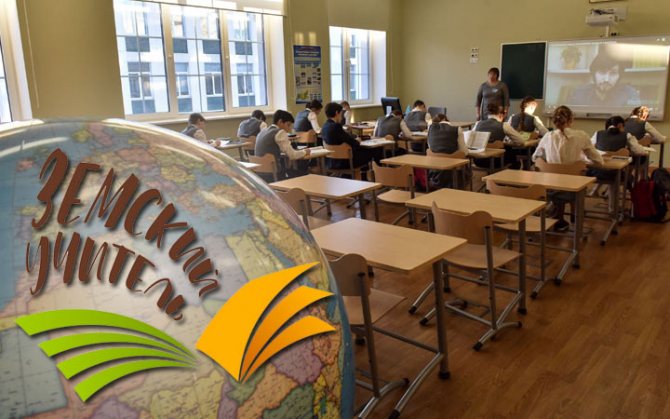
According to statistics, out of 42,000 schools operating in the Russian Federation, more than 26,000 are located in such small settlements (villages, urban settlements, workers' settlements). At the same time, graduates of pedagogical universities strive to find places in educational institutions in big cities or prefer to work outside their profile rather than go to the outback. There are many reasons for this:
- a more attractive rhythm of city life for young people;
- fear of moving and having to look for housing;
- low income of teachers, which does not allow them to rent living space.
As a result, we have a picture where in the city it is quite problematic for a teacher to find a place in a school, while in villages teachers are taught mainly by teachers of retirement age, who often find it difficult to reformat the educational process taking into account new requirements.
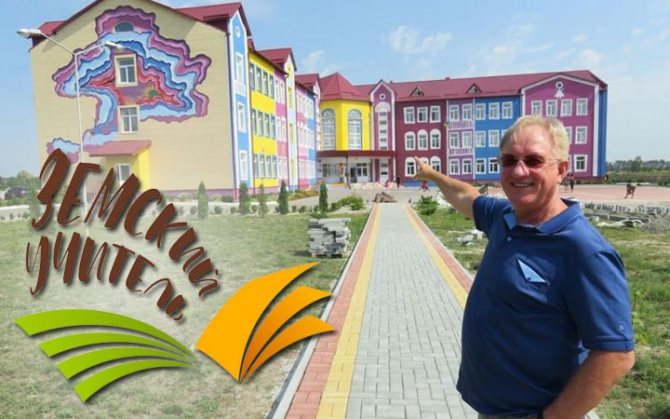
Today, rural schools are in the spotlight, which means that participants in the “Zemsky Teacher” project in 2021 will be able to count on bonuses such as:
- offices equipped with modern technology;
- classes with a small number of students;
- the administration's interest in creating comfortable conditions for the new teacher.

